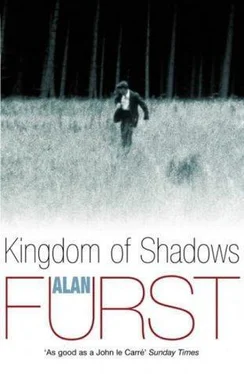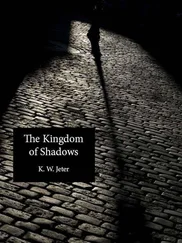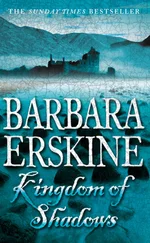Alan Furst - Kingdom of Shadows
Здесь есть возможность читать онлайн «Alan Furst - Kingdom of Shadows» весь текст электронной книги совершенно бесплатно (целиком полную версию без сокращений). В некоторых случаях можно слушать аудио, скачать через торрент в формате fb2 и присутствует краткое содержание. Жанр: Шпионский детектив, на английском языке. Описание произведения, (предисловие) а так же отзывы посетителей доступны на портале библиотеки ЛибКат.
- Название:Kingdom of Shadows
- Автор:
- Жанр:
- Год:неизвестен
- ISBN:нет данных
- Рейтинг книги:5 / 5. Голосов: 1
-
Избранное:Добавить в избранное
- Отзывы:
-
Ваша оценка:
- 100
- 1
- 2
- 3
- 4
- 5
Kingdom of Shadows: краткое содержание, описание и аннотация
Предлагаем к чтению аннотацию, описание, краткое содержание или предисловие (зависит от того, что написал сам автор книги «Kingdom of Shadows»). Если вы не нашли необходимую информацию о книге — напишите в комментариях, мы постараемся отыскать её.
Kingdom of Shadows — читать онлайн бесплатно полную книгу (весь текст) целиком
Ниже представлен текст книги, разбитый по страницам. Система сохранения места последней прочитанной страницы, позволяет с удобством читать онлайн бесплатно книгу «Kingdom of Shadows», без необходимости каждый раз заново искать на чём Вы остановились. Поставьте закладку, и сможете в любой момент перейти на страницу, на которой закончили чтение.
Интервал:
Закладка:
The spy pointed to his ears. Morath took the cotton out, the room still rang with concussion. “Do you see?” the spy said.
“Yes.”
“All the firing lines intersect, and the forts cover each other, so an attempt to storm will be very costly.” He reached into the inside pocket of his jacket and produced a few sheets of paper and a sharpened pencil. “Please,” he said. “Do best you can.”
The general said, “I can’t give you blueprints, of course, but we don’t mind if you sketch.”
The spy smiled. “My father always wanted to teach the espionage drawing. ‘So terrible,’ he would say.”
They left him to work, only Novotny stayed behind. “Well, now you’ve met our expert.”
“He seems a little-odd, maybe.”
“Yes. He is very odd. But a genius. An architect, a mathematician, a gunnery expert. Also he knows geology and mining science.” Novotny shook his head. “Likely there’s more, we just haven’t found out about it.”
Morath sketched, he wasn’t very good. He concentrated on showing how the fort and its independent firing points were fitted tight into the mountainside. They would be hard to bomb, he realized. Even a Stuka would have to fly directly at them, with machine guns tracking it the minute it appeared over the crest of the mountain.
“Draw the room,” Novotny said. “Don’t forget the elevator for the shells.”
His day had barely begun. They drove him to other forts. At one of them, overlooking a paved road that ran south from Dresden, the spy took a stick and drew semicircles in the dirt to show overlapping fields of fire. Morath crawled into two-man pillboxes, sighted along machine guns aimed down mown strips of cornfield, saw tank traps to fall in and tank traps made of cement posts, “dragon’s teeth,” wound in generous tangles of barbed wire. He squinted through Swiss sniperscopes fitted to Steyr rifles and fired a ZGB 33, the Czech machine gun made in Brno-used as the model for the British Bren, Br no/ En field-assassinating eight feather pillows gathering for an attack at the far end of a wheatfield. “Good shooting,” Novotny said.
After Morath reloaded, the curved-box magazine locked in place with a loud metallic snap.
“When you talk about your trip to the mountains,” Novotny said, “don’t forget to mention that Europe would be better off if Adolf did not have control of the Czech machine shops.”
Morath agreed. “Of course,” he said, “if it should come to that, I imagine the workers here would be-prone to error.”
But his conspiratorial smile was not returned. “Just between us,” Novotny said, “if it should happen that we are betrayed by those who claim to be our friends, we may not be so quick to give our lives in their service. That sort of business is bloody, Morath. There is always interrogation, always reprisal-you can only create a resistance movement when people don’t care about their lives.”
Novotny drove him back to the Europa that evening. A fine summer dusk, flights of swallows swooping and climbing in the sky above the hotels. In the lobby, the mother and daughter smiled at him, looking warmer than ever. Who would know? On a leather couch, a man in muttonchop whiskers and mountaineering costume was reading the Volkischer Beobachter. CZECH POLICE BURN SUDETEN FARMS went the headline. DOZENS INJURED. Animals confiscated. Dogs shot. Three young women missing.
Dr. Lapp, wearing a flat-brimmed straw boater at a jaunty angle, was waiting for him in the room, fanning himself with a room-service menu.
“I didn’t hear you knock,” Morath said.
“Actually, I did knock,” Dr. Lapp said, slightly amused. “Of course, I’ll be happy to apologize, if you wish.”
“Don’t bother.”
Dr. Lapp stared out the window. The streetlamps were on, couples strolling in the mountain air. “You know, I cannot abide these people, the Czechs.”
Morath hung up his jacket, then began undoing his tie. He did not want there to be a war in Europe, but he was going to take a bath.
“They have no culture,” Dr. Lapp said.
“They think they do.”
“What, Smetana? Perhaps you like Dvorak. Good God.”
Morath took off his tie, looped it over a hanger, sat on the edge of the bed, and lit a Chesterfield.
“I should mention,” Dr. Lapp said, “that I saw Count Polanyi not so long ago and that he sends his best regards. He said that you were considering, at one time, a vacation in Britain. Is it so?”
“Yes.”
Dr. Lapp nodded. “Can you still go?”
Morath thought about Cara. “Maybe,” he said. “Maybe not.”
“I see. Well, if you can, you should.”
“I’ll try,” Morath said.
“They’re weakening, the British. This morning’s London Times says that the Czech government ought to grant ‘self-determination’ to the Sudeten Germans, ‘even if it should mean their secession from Czechoslovakia.’ I would suppose that comes from Chamberlain’s office. We know he met American correspondents at a lunch at Lady Astor’s a few weeks ago and told them that Britain thought the Sudetenland ought to be turned over to Germany. In the interest of world peace, you understand. What his problem really is, is that he doesn’t trust the French, he doesn’t trust the Russians, and he fears, politically, the possibility that Britain might have to fight alone.”
“He doesn’t trust the French?”
Dr. Lapp’s laugh was dry, and delicate, and very brief.
It was almost dark, they sat in silence for a long time. Finally, Dr. Lapp stood. “There is something I want you to look at,” he said. “I’ll send it along tomorrow, if you don’t mind.”
He closed the door silently behind him. Morath left the room in darkness. He went into the bathroom and turned on the water. There was a bright green mineral stain below the spout. Good for the health. If you believed in it, he thought. The water ran slow, just then, and Morath waited patiently and listened to the distant thunder.
He booked a call to Paris early the next morning, the hotel operator rang his room an hour later. “So much traffic, sir,” she apologized. “Not usual for August.”
In Paris, a very elegant voice: “Good morning, this is Cartier.”
Polanyi liked to say that the great fault in poets was that they never sang of the power of money in affairs between men and women. “So for that we are left to the mercy of cynics-bartenders, novelists, or lubricious aunts.” Amusing when he said it but not so amusing in real life. Morath didn’t like himself for making this telephone call, but he could think of nothing else. The other possibility was flowers, and flowers weren’t enough.
He found himself telling the saleswoman almost everything. “I understand,” she said. She thought a moment, then added, “We have just completed a new design, a bracelet, which might be exactly right for Madame. A little exotic-emeralds set in silver and black onyx-but very personal. And not at all the usual thing. Do you think she would like that?”
“Yes.”
“She would be the first in Paris to have it-it’s a new style for us. Would she like that? ”
He knew she would. The saleswoman explained that the size was easily adjusted-so the bracelet could be sent by Cartier messenger to the residence. “And finally, monsieur “-now there was a different note in her voice, she was, for a moment, speaking from the heart-“the card.”
“Just say, ‘Love, Nicky.’ “
Later on, he was able to get through to an officer at the Credit Lyonnais. A bank draft would be sent over to Cartier that afternoon.
Novotny showed up at eleven and they worked most of the day, spending much of the time in the car, driving east on the northern borders of Moravia and Bohemia. More fortifications, more barbed wire, more artillery pointed toward Germany. “What happens to all this,” he asked, “if the Sudetenland is granted independence?”
Читать дальшеИнтервал:
Закладка:
Похожие книги на «Kingdom of Shadows»
Представляем Вашему вниманию похожие книги на «Kingdom of Shadows» списком для выбора. Мы отобрали схожую по названию и смыслу литературу в надежде предоставить читателям больше вариантов отыскать новые, интересные, ещё непрочитанные произведения.
Обсуждение, отзывы о книге «Kingdom of Shadows» и просто собственные мнения читателей. Оставьте ваши комментарии, напишите, что Вы думаете о произведении, его смысле или главных героях. Укажите что конкретно понравилось, а что нет, и почему Вы так считаете.












